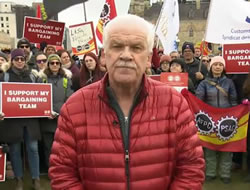 Canada’s biggest Federal Public Service union is ramping up its ongoing strike by moving picket lines to strategic locations such as ports, as both sides continue to accuse each other of poor communication.
Canada’s biggest Federal Public Service union is ramping up its ongoing strike by moving picket lines to strategic locations such as ports, as both sides continue to accuse each other of poor communication.
National President of the Public Service Alliance of Canada (PSAC), Chris Aylward said his members needed to further affect the economy to push the Government for a solution.
“We’re trying to have picket lines across the country in some strategic locations where it’s going to impact the Government, and we’re actually going to be escalating those actions …whether that’s ports across the country, or anything like that,” Mr Aylward (pictured) said.
While insisting he didn’t want to unsettle Canadians’ lives, Mr Aylward admitted the union’s actions would disrupt and delay imports and exports.
In the first few days of the strike picket lines were largely been confined to Government buildings, constituency offices and landmarks such as Parliament Hill.
Mr Aylward said the Federal Government had presented a revised contract proposal that did nothing to advance negotiations on salaries — one of the primary issues at play.
Spokesperson for the Treasury Board, Monica Granados said the Government recognised and respected the PSAC members’ right to strike.
“We are making every effort to ensure that strike action is as short as possible to restore services to Canadians, while ensuring a fair and reasonable deal for employees and for Canadians,” Ms Granados said.
However, Mr Aylward said the Government did not seem to be acting with any sense of urgency “which I guess demonstrates a lack of willingness on the Government’s part to get this done”.
More than 100,000 union members have walked off the job after contract talks broke down following months of negotiations.
Mr Aylward said the union’s top three priorities were wages, remote work and job security in relation to layoffs.
“We’ve got agreement on some of the other issues, such as the mandatory training for anti-racism and anti-discrimination in the workplace, but for the three main issues there is no agreement done yet,” he said.
The union is pushing for annual pay rises of 4.5 per cent over each of three years, dating back to 2021. The Treasury Board said it has offered the union a nine per cent rise over three years.
Ottawa, 24 April 2023











